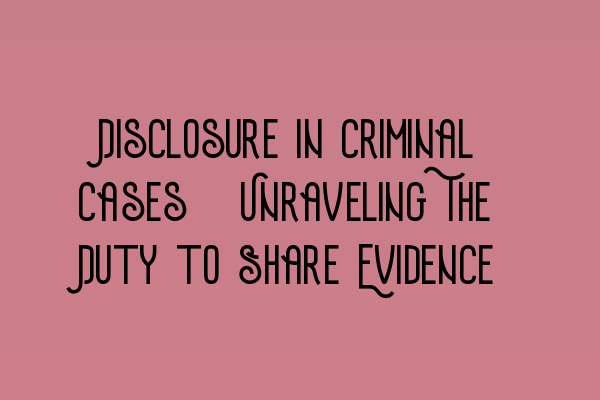Disclosure in Criminal Cases: Unraveling The Duty to Share Evidence
When it comes to criminal cases, fair play is of utmost importance. One key aspect of ensuring justice is the disclosure of evidence. The duty to share evidence is an essential component of the legal process, allowing both the prosecution and the defense to present their cases and ensuring a fair trial.
The Importance of Disclosure
In criminal cases, both the prosecution and the defense have a responsibility to disclose any evidence they possess to the other party. This duty to share evidence is crucial as it promotes transparency and fairness in the judicial system.
Disclosure allows both the prosecution and the defense to effectively prepare their cases, evaluate the strength of the evidence, and make informed decisions about strategy and tactics. It also helps to uncover any inconsistencies or weaknesses in the evidence, ensuring that all relevant facts are brought to light.
Without proper disclosure, the balance of justice can be compromised. A failure to disclose evidence can result in wrongful convictions or the acquittal of guilty individuals, undermining public trust in the legal system. Therefore, understanding the duty to share evidence is essential for all legal professionals involved in criminal cases.
What Evidence Must be Disclosed?
The duty to share evidence encompasses a broad range of materials, including but not limited to:
- Witness statements: Any statements made by witnesses, including those who support the prosecution’s case or the defense’s case, must be disclosed.
- Expert reports: Reports prepared by expert witnesses, such as forensic scientists or psychologists, must also be shared.
- Police reports: Reports generated during the investigation, documenting witness interviews, crime scene findings, and other relevant details, should be disclosed.
- Audio and video recordings: Any recorded evidence, such as surveillance footage or recorded interviews, must be shared.
- Exculpatory evidence: Evidence that tends to show the innocence of the accused must be disclosed, even if it is not directly in the possession of the prosecution.
It is important to note that the duty to share evidence extends not only to materials that support a party’s case but also to evidence that may undermine their position. This includes evidence that may cast doubt on the credibility of witnesses, challenge the validity of scientific analysis, or raise questions about the conduct of law enforcement.
The Consequences of Non-Disclosure
Failure to comply with the duty to share evidence can have serious consequences. In some cases, non-disclosure can lead to a mistrial, as the integrity of the proceedings may be compromised. Additionally, non-disclosure can damage the credibility of the party responsible for withholding evidence and may result in legal repercussions.
In recent years, there have been several high-profile cases where non-disclosure of evidence has come to light, sparking public outrage and leading to miscarriages of justice. These instances highlight the importance of upholding the duty to share evidence and the need for robust systems and processes to ensure compliance.
Legal professionals involved in criminal cases must understand their obligations and take proactive measures to ensure proper disclosure. This includes conducting thorough reviews of the evidence, engaging in open and honest communication with the opposing party, and seeking guidance from supervisors or experienced colleagues.
Conclusion
Disclosure is an essential element of the criminal justice system, enabling a fair and transparent legal process. The duty to share evidence is a responsibility that both the prosecution and the defense must uphold to ensure the integrity of criminal cases.
By understanding what evidence must be disclosed, legal professionals can navigate the complexities of disclosure and contribute to a just resolution. Compliance with the duty to share evidence promotes trust in the legal system and upholds the values of fairness and truth.
For more information on related topics, check out these articles:
- SQE Sample Papers: Practice for Exam Success
- Focus Areas in SQE1 and SQE2: Mastering Key Concepts
- Adjusting Your SQE Strategy Based on Mock Performance
- SQE Mock Debrief Sessions: Critical Steps for Improvement
- Post-Mock Feedback Sessions: Improving Your Performance
